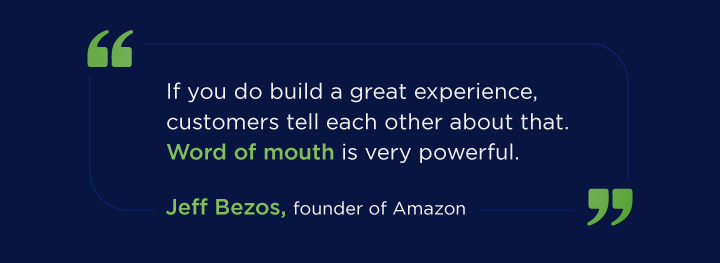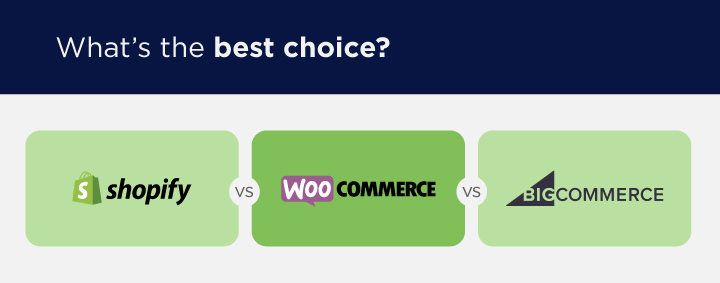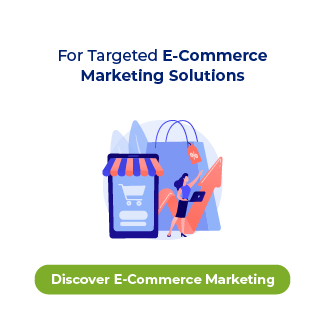
Building a scalable, robust, and beautiful e-commerce website has not become a necessity but a mandate in today’s rapidly evolving landscape. As a matter of fact, the question is not whether you have an e-store; instead, how effective it is. Of course, you don’t want to build an e-commerce website that lacks marketing automation or cannot be scaled when the time comes. That would be a nightmare!
And when 20.8% of purchases are expected to take place online in 2023, your e-commerce game *must* be strong. What does this mean for e-comm business owners? Choosing the right e-commerce platform. But that leaves with another question. Which platform to choose? And even if you zero down on one, how do you maximise its usage? Well, the market is dominated by three prominent e-commerce platforms.
*drumroll*
-
Shopify
-
WooCommerce
-
BigCommerce
Each of these platforms brings its unique strengths to the table, catering to the diverse needs of both brands and consumers. Our comprehensive analysis will unveil the remarkable ways these platforms empower brands to create an enticing online presence while simplifying the consumer journey for seamless and satisfying shopping experiences.
Building an E-store of Your Dream Shouldn’t Be a Nightmare.

E-commerce platforms are as dynamic as they can be. A perpetual content upgrade, massive inventory, countless third-party app integrations and more. Thus, for a growing e-commerce brand, creating an e-store can become a daunting task. However, choosing the best e-commerce platform can save your day.
Let's dive into how choose an e-commerce platform
Shopify:
Shopify is one of the rapidly rising platforms in the e-commerce market, with a share of 16.36% worldwide. It stands out as a user-friendly e-commerce platform that simplifies the process of setting up an online store for brands of all sizes. Its intuitive interface allows business owners, even those with minimal technical expertise, to establish a professional-looking e-store quickly.
For Brands:
-
User-Friendly Setup: Shopify offers a straightforward setup process with a variety of professionally designed templates to choose from. This not only saves time but also ensures a visually appealing online presence.
-
Customization: Brands can tailor their e-stores through a range of themes and apps, allowing them to create a unique identity and brand experience.
-
Mobile-First: With the ever-growing mobile shopping trend, Shopify ensures that e-stores are mobile-responsive, offering a seamless experience to consumers on various devices.
-
Out-of-the-Box Marketing Automation: Shopify simplifies marketing automation through its extensive app store. Brands can easily integrate marketing tools like Mailchimp, Klaviyo, or Omnisend to create email campaigns, abandoned cart recovery, and personalised recommendations. The platform's native features also allow brands to schedule promotions and discounts to boost customer engagement.
-
Tech Integration: Shopify enables CRM integration through apps like HubSpot and Salesforce. This streamlines customer relationship management by allowing brands to gather and analyse customer data, personalise communications, and provide better customer service. It also offers a wide range of tech integrations, including payment gateways, inventory management systems, and third-party apps.
-
Inventory Management: Shopify offers a user-friendly inventory management system that simplifies the process of adding, updating, and tracking products. You can easily manage product variants, stock levels, and organise inventory through its intuitive dashboard.
-
Hosting Cost: Shopify is a hosted platform, and hosting is included in its pricing. Brands pay a monthly subscription fee, which covers hosting, security, and maintenance.
For Consumers:
-
Intuitive Browsing: Shoppers enjoy a smooth and intuitive shopping journey on Shopify-powered websites. The clean design and easy navigation enhance the overall consumer experience.
-
Effortless Checkout: Shopify offers a streamlined checkout process, reducing cart abandonment rates and making transactions quick and hassle-free for consumers.
-
Secure Transactions: Consumers can shop with confidence, as Shopify provides robust security measures to protect sensitive information.
BigCommerce:
BigCommerce is a top e-commerce platform, particularly suitable for brands looking for scalability, security, and extensive integration options.
-
Scalability: BigCommerce is known for its scalability, making it an ideal choice for fast-growing businesses. Brands can expand their product offerings without worrying about technical limitations.
-
Security: BigCommerce takes security seriously, providing advanced security features to safeguard customer data, an essential consideration in today's digital landscape.
-
Out-of-the-Box Marketing Automation: BigCommerce offers built-in marketing tools, including abandoned cart recovery, email marketing, and product recommendations. These features simplify marketing automation tasks, making it easier for brands to engage with their audience.
-
Tech Integration: : BigCommerce integrates with popular CRM systems like Salesforce and Zendesk. Brands can manage customer relationships effectively and ensure a high level of customer satisfaction. It also provides tech integrations for various needs, from payment gateways like PayPal and Stripe to shipping and inventory management solutions.
-
Inventory Management: BigCommerce is well-known for its powerful inventory management features. It supports multi-channel inventory management, allowing brands to sync inventory across different sales channels seamlessly.
-
Hosting Cost: BigCommerce is a hosted platform similar to Shopify. Hosting costs are included in the subscription fee. The advantage is that brands don't have to worry about selecting a hosting provider or managing server resources.
For Consumers:
-
Reliable Shopping Experience: Consumers benefit from the platform's reliability, ensuring they can shop without technical glitches or interruptions.
-
Feature-Rich Shopping: BigCommerce-powered stores often offer an array of features like advanced search functionality, detailed product information, and personalised product recommendations.
-
Mobile-Friendly:: BigCommerce prioritises mobile responsiveness, ensuring consumers can shop on their preferred devices.
WooCommerce:
WooCommerce, albeit a WordPress plugin, is the goliath of the e-commerce platforms, with a 63.65% market share. It provides brands with a high degree of flexibility and control over their e-commerce ventures. It seamlessly integrates with WordPress, giving brands the power of a content-rich website and an e-store in one package.
For Brands:
-
Content Integration: Brands benefit from the synergy of e-commerce and content marketing. They can use WordPress's blogging capabilities to engage with their audience, improve SEO, and create valuable content.
-
Endless Customisation: WooCommerce provides a wide array of themes and plugins, making it possible to craft a unique and tailored online store. Brands can choose from thousands of add-ons for added functionality.
-
SEO-Friendly: WordPress's built-in SEO features enable brands to optimise their online presence and rank higher in search engine results, attracting more visitors.
-
Out-of-the-Box Marketing Automation: WooCommerce leverages the power of WordPress, offering a plethora of marketing automation plugins like Mailchimp for WooCommerce and AutomateWoo. Brands can set up personalised email campaigns, segment their audience, and automate marketing tasks.
-
Tech Integration: WooCommerce seamlessly integrates with CRM platforms such as HubSpot and Zoho CRM. Brands can centralise customer data, track interactions, and optimise their customer relationship management processes. Whether it's payment gateways, shipping options, or inventory management systems, WooCommerce provides flexibility in tech integration.
-
Inventory Management:WooCommerce offers robust inventory management capabilities, particularly suited for brands with extensive product catalogues. It allows for fine-grained control over products, variations, and stock levels.
-
Hosting Cost: WooCommerce is a self-hosted solution, which means brands are responsible for obtaining and managing their hosting. Hosting costs can vary significantly depending on the hosting provider and the resources required.
For Consumers:
-
Rich Content Experience: Shoppers have access to informative blog content and product descriptions, providing them with a comprehensive understanding of products and services.
-
Seamless Shopping: WooCommerce ensures consumers can easily find, compare, and purchase products with a user-friendly interface and smooth navigation.
-
Consistent Branding: The ability to customise the shopping experience means consumers can immerse themselves in a brand's unique identity.
Now we know bits and pieces about each platform; the next step is to choose the right fit for your brand.
Shopify vs WooCommerce vs BigCommerce: What’s the best choice?

While all three e-commerce platforms offer unique speciality, Shopify emerges as a superior choice. Its user-friendly interface, hassle-free hosting, extensive app ecosystem, responsive customer support, mobile optimisation, integrated marketing tools, large user community, robust security, and scalability make it one of the best e-commerce platforms. With its intuitive setup, businesses of all sizes can quickly establish and manage online stores. At the same time, the platform's all-in-one solution streamlines the technical aspects, offering a secure and reliable e-commerce environment. This, combined with its marketing features, mobile-friendliness, and vibrant user community, makes Shopify an outstanding choice for those seeking an accessible, feature-rich, and well-supported e-commerce solution.
Final Thoughts
In the realm of e-commerce platforms, the choice between Shopify, WooCommerce, and BigCommerce is a crucial one, with each option offering its own set of advantages. While all three platforms have their merits, but Shopify emerges as the standout choice for many businesses. Its user-friendly interface, comprehensive hosting solution, and extensive app ecosystem, and stellar customer support make it a top pick for those seeking an efficient and hassle-free e-commerce experience. Shopify's commitment to mobile optimisation, integrated marketing tools, and robust security further solidifies its position as a go-to platform for brands looking to establish a strong online presence and simplify the complexities of e-commerce.
However, “how to choose the right e-commerce platform” is just the beginning. Building and scaling your e-store requires in-depth technical expertise and the right strategy. This is where Amura steps in. As a leading e-commerce marketing agency with a track record of empowering brands to succeed in the digital landscape, we offer the expertise and resources needed to maximise the potential of your e-store. With a dedicated team of with in-house tech experts, we can tailor any e-commerce platform to meet your unique business needs. Whether it's creating a visually appealing storefront, optimising for search engines, or implementing advanced marketing strategies, we provide a comprehensive solution to help your e-store thrive.
Over the years, we have helped a number of e-commerce brands like Symphony, BeeBaby, TheGoodHerbs, NPAV, and many more scale their businesses. Whether it is establishing an e-store or driving sales, Amura is uniquely positioned to skyrocket your e-store business. With Amura as your growth marketing agency, you're not just choosing a platform; you're selecting a partner that can guide you through every step of the e-commerce journey, from inception to expansion.







